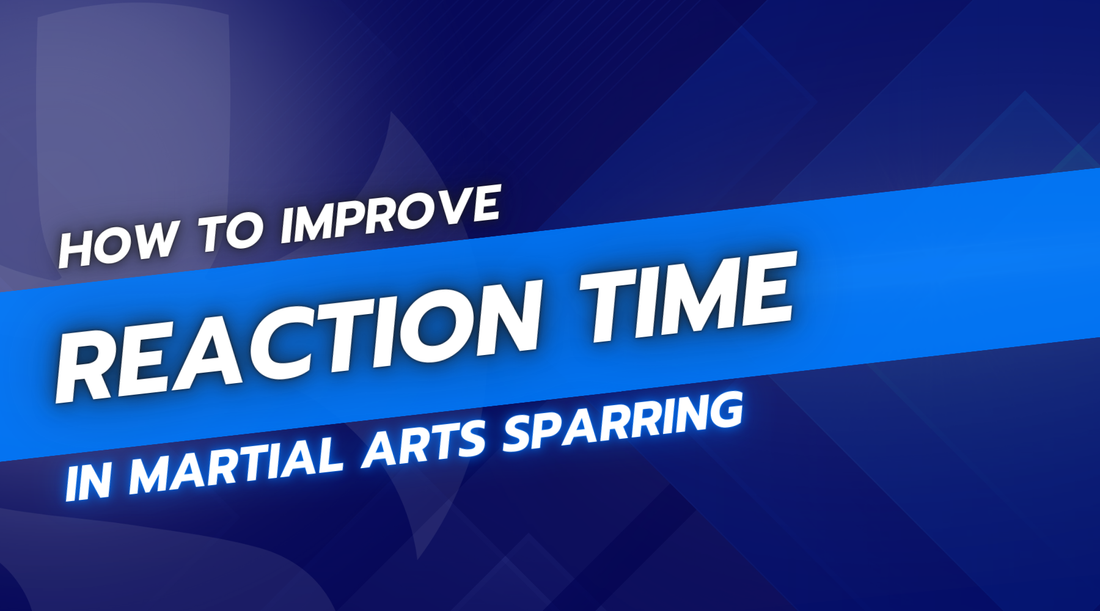
How to Improve Reaction Time in Martial Arts Sparring
Share
Improving reaction time in martial arts sparring can be the difference between landing a perfect counterattack and getting hit by an opponent. Reaction time plays a crucial role in sparring, where split-second decisions often determine the outcome. This article will guide you through various strategies to improve your reaction time, ensuring you stay one step ahead in the ring.
Understanding Reaction Time
Reaction time in martial arts refers to the interval between recognizing a stimulus, like an opponent’s punch, and responding to it, such as blocking or countering. It’s not just about speed; it involves perceptual and decision-making processes that happen in the blink of an eye. Reaction time differs from reflexes in that it’s more conscious and deliberate, involving cognitive processes. Quick reactions can make you more unpredictable and adaptable during sparring, giving you a significant edge.
Factors Affecting Reaction Time
Several factors can influence your reaction time. Physically, aspects such as age, overall fitness, and even genetics play a role. Mentally, your focus, stress levels, and fatigue can either sharpen or dull your responsiveness. Environmental factors, like the conditions of your training area or external distractions, can also have an impact. Understanding these factors can help you tailor your training to address any weaknesses.
Physical Training to Improve Reaction Time
Physical training is foundational in improving reaction time. Incorporating speed and agility drills, focusing on exercises that activate fast-twitch muscle fibers, and reaction time-specific training are essential steps.
Speed and Agility Drills
Speed and agility drills are designed to enhance your quickness and coordination.
- Ladder Drills: These improve foot speed and coordination, crucial for quick movements in sparring.
- Cone Drills: By weaving in and out of cones, you develop directional speed and improve your body’s response to sudden changes in movement.
- Shuttle Runs: These drills boost your explosive speed, enhancing your ability to close distance or evade attacks quickly.
Fast-Twitch Muscle Fiber Exercises
Fast-twitch muscles are responsible for rapid, explosive movements.
- Plyometric Exercises: Such as box jumps and burpees, these exercises improve your explosive power, translating into quicker strikes and defensive maneuvers.
- Explosive Strength Training: Lifting weights with speed can condition your muscles to contract more forcefully and rapidly.
- Sprinting Drills: These are excellent for developing leg speed and overall explosive power.
Cognitive Training for Faster Reactions
The brain plays a critical role in reaction time, as it processes the incoming information and decides how to respond. Cognitive training, therefore, is just as important as physical training.
Brain Training Apps and Tools
Using apps designed to train your reaction time can be highly effective. These tools offer a variety of exercises that improve both decision speed and accuracy. Apps like Lumosity or Peak provide games specifically aimed at enhancing cognitive speed and focus, which directly translates to better reactions in sparring.
Visualization and Focus Techniques
Visualization can sharpen your mental preparation. By mentally rehearsing sparring scenarios, you can improve your anticipation and reaction time. Techniques such as meditation and controlled breathing can also help maintain focus and reduce reaction-slowing stress during sparring.
Practicing Sparring Scenarios
Realistic sparring drills are vital in applying what you’ve trained. The more varied your practice partners, the better your adaptability and reaction speed. Drills should include reading your opponent’s body language and predicting their next move, which can significantly reduce your response time.
Simulated Sparring Scenarios
- Slow-Motion Sparring: This helps in refining techniques and understanding movements without the pressure of speed, allowing you to react correctly when things speed up.
- Fast-Paced Sparring: Once comfortable, gradually increase the pace to condition your body and mind for high-speed reactions.
Reaction-Based Sparring Drills
- Blocking Drills: Practice quick blocks against random strikes to build reflexive defense mechanisms.
- Counterattack Drills: Develop your ability to immediately respond with a counter after a block or evasion.
- Feint and Response Drills: Improve your reaction to feints, which are designed to test your judgment and reaction accuracy.
Enhancing Reflexes with Equipment
Using equipment like reaction balls, which bounce unpredictably, can train your eyes and muscles to react without hesitation. Light and sound training devices can also stimulate fast decision-making under different sensory inputs, closely simulating real sparring conditions. Reflex bags are another excellent tool, helping to enhance both reaction speed and precision.
Nutrition and Reaction Time
Your diet significantly impacts both cognitive and physical performance. Consuming foods rich in omega-3 fatty acids, antioxidants, and proteins can boost brain function and muscle performance. Hydration also plays a key role; even mild dehydration can impair focus and reaction time. Aim for balanced meals that provide steady energy and keep your mind sharp.
Rest and Recovery
Rest is often the overlooked component of training. Adequate sleep is essential for cognitive function, including reaction time. Lack of sleep can slow your responses and impair decision-making. Incorporating active recovery techniques, like light stretching or foam rolling, can keep your muscles fresh and ready to respond quickly.
Mindfulness and Reaction Time
Mindfulness techniques, such as meditation, can reduce stress and improve your control over your responses. Regular practice of mindfulness helps you stay calm under pressure, allowing you to maintain clear thinking and sharp reactions even in intense sparring sessions.
Common Mistakes to Avoid
Avoid the pitfalls of overtraining, which can lead to fatigue and slower reactions. Neglecting mental training is another common mistake—reaction time isn't just about physical speed, but also about how quickly your brain processes and responds to what it sees. Lastly, don’t focus solely on speed at the expense of technique; a quick but sloppy response can be counterproductive.
Final Thoughts
Improving reaction time in martial arts sparring requires a holistic approach that combines physical, cognitive, and mental training. By incorporating the strategies outlined in this guide, you can enhance your reaction speed and overall sparring performance. Remember, progress takes time and consistency, so stay dedicated to your practice, and you’ll see results.
